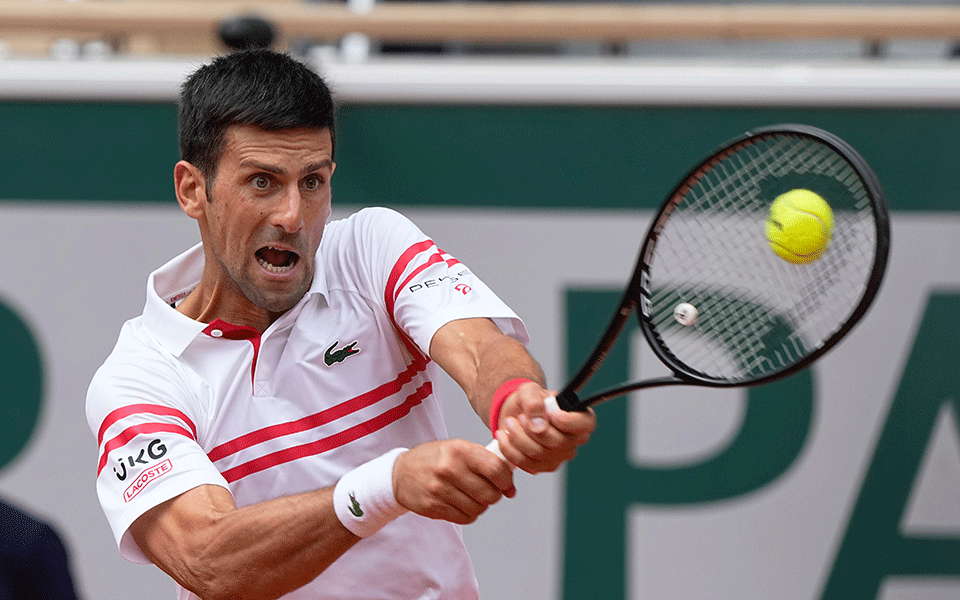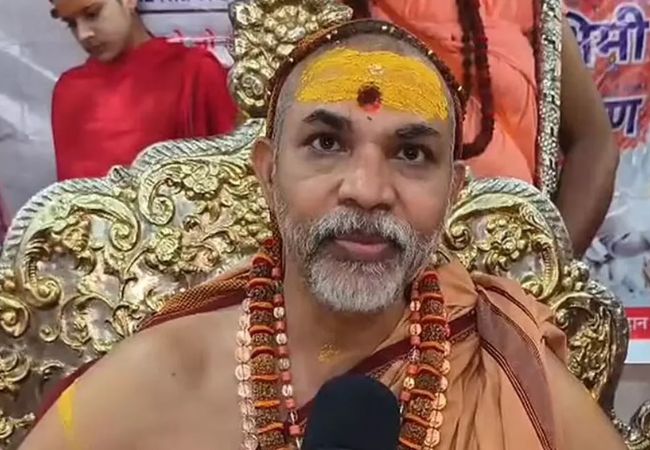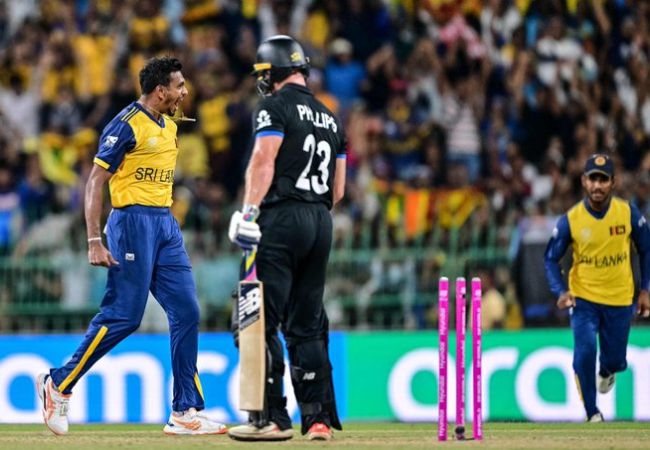Paris: Sprinting, sliding and stretching, anticipating each other's moves for four sets and more than four hours, Novak Djokovic and Rafael Nadal produced a masterpiece in the French Open semifinals.
Djokovic, as it happens, is one of only two men in tennis history who knows what it takes to beat Nadal at Roland Garros. And now Djokovic has done it twice this time ending Nadal's bid for a 14th championship there and record-breaking 21st Grand Slam title overall by coming back to win their 58th career matchup 3-6, 6-3, 7-6 (4), 6-2 on Friday night.
Just one of these nights and matches that you will remember forever, said the top-seeded Djokovic, who trailed 2-0 in the closing set before reeling off the last half-dozen games to reach his sixth final at the clay-court major tournament.
Definitely the best match that I was part of ever in Roland Garros, for me, and (one of the) top-three matches that I ever played in my entire career considering quality of tennis, playing my biggest rival on the court where he has had so much success and has been the dominant force in the last 15-plus years, Djokovic said, and the atmosphere, which was completely electric.
It was Nadal's third loss in 108 matches at a tournament he won each of the last four years, including by beating Djokovic in the 2020 final.
Nadal's first defeat at the French Open came against Robin Soderling in 2009; the next against Djokovic in 2015.
Each time you step on the court with him," Djokovic said, "you know that you have to kind of climb Mt. Everest to win against this guy here.
And to think: There wasn't even a trophy at stake in this one. That will happen Sunday, when Djokovic, a 34-year-old from Serbia, faces Stefanos Tsitsipas, a 22-year-old from Greece.
The fifth-seeded Tsitsipas edged sixth-seeded Alexander Zverev 6-3, 6-3, 4-6, 4-6, 6-3 earlier Friday to reach his first Grand Slam final. It's Djokovic's 29th as he seeks a second title at the French Open and 19th major championship overall to pull within one of the men's Slam mark shared by Nadal and Roger Federer.
Tsitsipas already had given away all of a two-set lead in his semifinal Friday when he double-faulted to trail love-40 in the opening game of the fifth. But Tsitsipas steeled himself to win five consecutive points, then broke to go up 3-1.
I'm someone who fights. I was not willing to give up yet. I think I did few things right that worked in my favor, said Tsitsipas, who entered the day 0-3 in major semifinals.
It was a breath of fresh air, that first game, he said. I felt revitalized.
His semifinal offered a measure of drama. But in truth, Tsitsipas-Zverev was merely an opening act before the headliners.
Nadal and Djokovic really riled up the raucous crowd at Court Philippe Chatrier.
Midway through the third set, Djokovic won a 23-stroke point with a forehand winner and windmilled his arms a half-dozen times, earning a standing ovation and chants of No-vak! No-vak! On the very next point, Nadal produced a forehand winner and screamed, prompting chants of Ra-fa! Ra-fa! and a wave in the stands.
Nadal acknowledged fatigue might have been a factor during his poor play in the tiebreaker, including a double-fault and a flubbed volley.
Mistakes can happen, the 35-year-old from Spain said.
But if you want to win, you can't make these mistakes.
That set alone lasted 1 hour, 33 minutes, and an 11 p.m. nationwide curfew in place because of COVID-19 was approaching. Djokovic's previous match had been delayed more than 20 minutes while the audience limited to 5,000 people under coronavirus restrictions was cleared out of the stadium, but an announcement was made Friday to let everyone know the government agreed to let them stay until the end of the match.
Earlier chants in French of We won't leave! were replaced by choruses of the national anthem and cheers of thanks for President Emmanuel Macron.
Nadal noted afterward that playing in the cooler night air meant balls bounced lower, lessening the effect of his lefty forehand's heavy topspin.
That's more favorable for him, the conditions, Nadal said.
By the way, doesn't matter. That's tennis. The player who (gets) used to the conditions better is the player who (deserves) to win. So no doubt, he deserved to win.
The intensity was palpable from the outset of the evening, and Nadal zoomed to a 5-0 lead, reminiscent of last year's final, which he won 6-0, 6-2, 7-5. That was only the fourth shutout set lost by Djokovic in 341 career Grand Slam matches up to that point and the first in a major final.
There wouldn't be another Friday, because Djokovic made two key tactical adjustments moving much further back than usual to return serve and deciding to focus on serving toward Nadal's backhand and quickly made clear this would be a classic between two of the greatest ever at what they do.
They defended in ways rarely seen. Found the right mix of power and touch. Conjured up impossible-at-first-glance winners that no one else would try, let alone successfully employ. Returned as well as anyone, combining to generate 38 break points.
No two men in the professional era, which dates to 1968, have played each other more than this duo (Djokovic now leads 30-28). They know each other, and each other's strengths and weaknesses and patterns, so well.
Back-and-forth they went from game to game, point to point, shot to shot. Through exchanges that lasted 10 strokes, 20 strokes, more, they created marvelous points, too many to count or recount.
They forced each other to come up with the goods over and over again, in a version of Can you top this? And the answer, over and over again, was Yes!
Neither would give up or give in.
Djokovic shrugged off his early hole. He saved a set point while down 6-5 in the third. Nadal recovered from the dropped tiebreaker to steal a break at the beginning of the fourth.
But Djokovic broke back to 2-all and was on his way. omething clicked, Djokovic said.
Let the Truth be known. If you read VB and like VB, please be a VB Supporter and Help us deliver the Truth to one and all.
Lucknow (PTI): The Uttar Pradesh Congress on Wednesday staged a statewide protest demanding a fair and transparent inquiry into the FIR lodged against Swami Avimukteshwaranand Saraswati and those who filed the complaint against him.
In a statement issued here, the party said memorandums addressed to Prime Minister Narendra Modi were submitted through district magistrates in all districts of the state.
Uttar Pradesh Congress spokesperson Manish Hindvi told PTI that the memorandums were handed over through the district administration in all 75 districts.
In the memorandum, the party alleged that Saraswati and his disciples were "unnecessarily harassed and humiliated" by police on the occasion of Amavasya and were prevented from taking a ritual bath (at the Magh Mela). It further alleged that some disciples were manhandled and taken to a police station.
The memorandum also claimed that an FIR was later registered against Saraswati, his disciple Swami Mukundanand Brahmachari and several unidentified persons in a sexual harassment case. It termed the case a "conspiracy" aimed at tarnishing the seer's reputation.
Citing Articles 25 and 26 of the Constitution, the memorandum stated that these provisions guarantee religious freedom and the right of religious denominations to manage their own affairs.
It described the position of shankaracharya held by Saraswati as "one of the highest spiritual posts in Sanatan tradition" and alleged that the entire episode appeared to have been "orchestrated in a planned manner".
"We request that the background of the persons who got the FIR registered be investigated in a transparent manner by a retired high court judge and strict action be taken against them," the memorandum said.
It also sought a "fair and transparent probe" into the allegations levelled against Saraswati so that the truth could be established.
Earlier, Uttar Pradesh Congress president Ajay Rai had told reporters in Varanasi after meeting Saraswati that the party stood firmly with him.
The Congress said it would continue to press for an impartial inquiry into the entire episode.
On February 21, an FIR was lodged in Prayagraj against Saraswati and his disciple Mukundanand Brahmachari on charges of sexually abusing two persons, including a minor, over the past year at a gurukul and religious congregations, including the recently concluded Magh Mela.
Days after he was booked, Saraswati had said on Monday that he would not oppose his arrest and asserted that the "fabricated story" would be exposed sooner or later.
At a press conference on Wednesday, Saraswati alleged that criminals rule in Uttar Pradesh, level allegations and influence investigations, as he denied having any contact with the two persons for whose alleged sexual abuse he has been booked.



_vb_77.jpeg)
_vb_00.jpeg)
